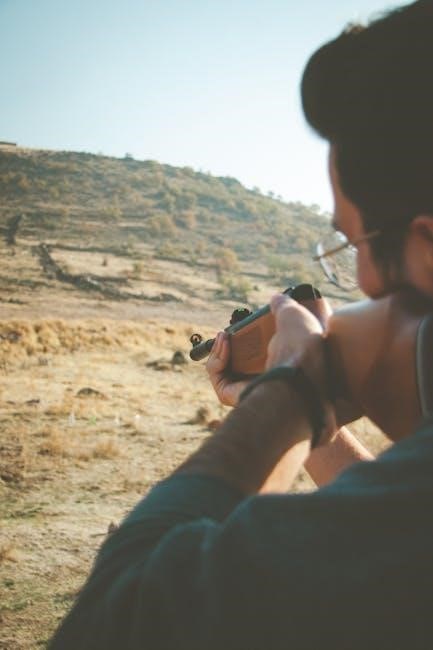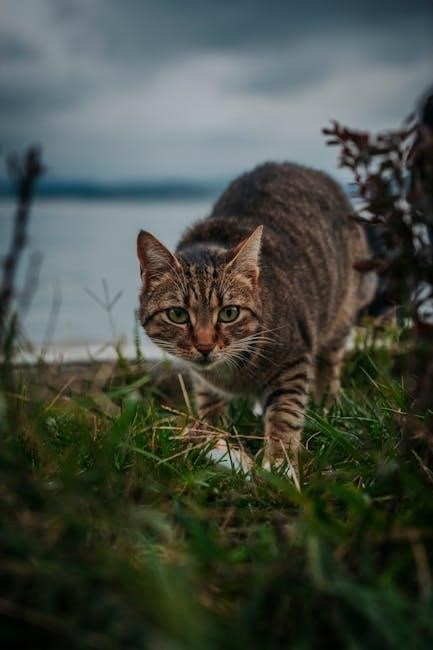guided turkey hunts
Guided turkey hunts offer an exciting way to pursue wild birds with expert guidance, ensuring a safe and successful experience. Hunters benefit from professional knowledge of habitats, tactics, and regulations, making it ideal for both novices and seasoned hunters seeking trophy birds. These hunts often require state-issued licenses and adherence to seasonal restrictions, emphasizing ethical and sustainable practices. By combining strategy, patience, and skill, guided hunts provide unforgettable adventures in nature.
What Are Guided Turkey Hunts?
Guided turkey hunts involve expert guides leading hunters in pursuit of wild turkeys. These hunts often take place on private or public lands, utilizing decoys, calls, and strategic positioning. Hunters typically need state-issued licenses and permits, with outfitters handling logistics like permits and land access. The guides’ local knowledge enhances success rates, making these hunts ideal for both new and experienced hunters seeking a well-organized adventure. Safety and ethical practices are emphasized to ensure a sustainable and enjoyable hunting experience.
Why Choose a Guided Turkey Hunt?
Guided turkey hunts offer a structured and strategic approach to hunting, enhancing success rates for both novice and experienced hunters. Expert guides provide localized knowledge, ensuring hunters are in prime locations during peak times. Outfitters handle logistics, including permits and land access, allowing hunters to focus on the hunt. These guided experiences often include tailored strategies, decoy placement, and calling techniques. The combination of professional guidance and access to private or managed lands increases the likelihood of a successful and memorable hunt, making guided turkey hunts a popular choice among enthusiasts.

Preparing for a Guided Turkey Hunt
Preparation is key for a successful guided turkey hunt. Hunters should complete safety courses, gather necessary gear, and understand local regulations to ensure a well-planned adventure.
Necessary Gear and Equipment
Essential gear for a guided turkey hunt includes a reliable shotgun, appropriate ammunition, and a variety of turkey calls. Decoys, camouflage clothing, and a comfortable blind are also crucial. A good pair of binoculars helps spot birds from a distance, while a sturdy backpack keeps gear organized. Don’t forget a hunting knife, extra batteries, and water. Seasoned guides often recommend lightweight, breathable fabrics for mobility and stealth. Familiarizing yourself with your equipment beforehand ensures a smoother hunting experience. Always check local regulations for any specific gear restrictions.
Firearms and Ammunition for Turkey Hunting
A 12-gauge shotgun is the most popular choice for turkey hunting, offering reliable performance at close to medium ranges. Modified or full choke tubes are recommended for tighter shot patterns. Ammunition selection is critical, with #4 to #6 shot being ideal for turkeys. Ensure your firearm is well-maintained and sighted in for accuracy. Practice shooting at various distances to understand your effective range. Always follow safety guidelines and use appropriate gear to handle firearms responsibly. Check local regulations for any specific restrictions on firearms or ammunition.
Turkey Calls and Communication Tactics
Effective turkey calling is essential for successful hunts. Diaphragm and box calls are popular for their realistic sound and versatility. Start with soft, subtle calls to mimic natural turkey communication. Overcalling can alarm birds, so patience and timing are key. Use clucks, purrs, and yelps to engage gobblers, adjusting pitch and rhythm based on responses. Decoy placement enhances call effectiveness, creating a convincing setup. Practice calls to ensure they sound natural, as turkeys are wary of unnatural sounds. Clear communication strategies are vital for attracting and closing in on your target effectively.

Regulations and Licensing
Guided turkey hunts require state-issued licenses and permits. Hunters must understand bag limits and seasonal restrictions to ensure compliance with local conservation laws and ethical practices.
State-Issued Hunting Licenses and Permits
State-issued hunting licenses and permits are essential for guided turkey hunts. Hunters must obtain these documents to legally participate, ensuring compliance with local wildlife regulations. Private land exceptions exist in some areas, but licenses are typically mandatory. Researching outfitters and their adherence to licensing requirements is crucial for a lawful experience. Always verify the guide service’s permits to avoid complications. Staying informed on licensing procedures helps hunters navigate regulations smoothly and enjoy their adventure responsibly. Proper documentation ensures a hassle-free and ethical hunting experience for all participants.
Understanding Bag Limits and Seasonal Restrictions
Bag limits and seasonal restrictions are critical for conservation and ethical hunting practices. These regulations vary by state, ensuring sustainable turkey populations. Hunters must adhere to limits on the number of birds they can harvest, typically one or two gobblers per season. Seasonal restrictions define when hunting is permitted, protecting turkeys during breeding and nesting periods. Understanding these rules is essential to avoid legal issues and promote wildlife conservation. Guides often help hunters navigate these guidelines, ensuring compliance and a responsible hunting experience that balances opportunity with environmental stewardship.
Hunting Strategies and Tactics
Guided turkey hunts employ proven strategies like decoy placement, call tactics, and patient stalking to outsmart gobblers. Seasoned guides tailor methods to terrain and turkey behavior for success.
Afternoon Hunting Tactics for Eastern Turkeys
Afternoon hunting for Eastern turkeys demands patience and a passive approach, especially during midday when birds are less active. Guides often position hunters in elevated areas or field edges where turkeys may roam. Silent stalking and careful observation are key, as gobblers may be wary after morning activity. Soft, intermittent calls mimic natural hen behavior, enticing males without startling them. Decoy placement near feeding zones can also attract curious toms. Success relies on remaining still, blending into surroundings, and waiting for the perfect shot opportunity.
The Role of Decoy Placement in Successful Hunts
Decoy placement is vital for attracting turkeys, particularly in open areas where visibility is high. Guides strategically position realistic hen and jake decoys to mimic natural flock behavior, drawing in gobblers. Decoys should face away from hunters to appear non-threatening. Placing them near feeding zones or known turkey paths enhances effectiveness. Realistic decoys and precise positioning are essential, as turkeys have sharp eyesight and can detect unnatural setups. Expert guides choose optimal locations, increasing the likelihood of a successful hunt by creating an inviting and believable scenario for the birds.

Safety and Best Practices
Safety and Best Practices involve taking hunter safety courses, adhering to firearms guidelines, wearing blaze orange, and following expert guides to minimize risks.
Importance of Hunter Safety Courses
Hunter safety courses are essential for ensuring responsible and ethical hunting practices. They teach fundamental knowledge of firearms handling, wildlife conservation, and environmental awareness. These courses emphasize the importance of following safety protocols to prevent accidents and promote sustainable hunting. Even in areas where certification isn’t mandatory, enrolling in a safety course demonstrates a commitment to responsible hunting. Experienced instructors provide hands-on training, covering topics like firearm maintenance, first aid, and ethical hunting practices. Completing a safety course not only enhances your skills but also fosters a culture of respect for nature and wildlife.

General Firearms Safety Guidelines
Firearms safety is paramount during guided turkey hunts. Always treat guns as loaded, keeping fingers off triggers until ready to shoot. Ensure the barrel points in a safe direction, away from people and animals. Verify targets and beyond before firing to avoid accidents. Use appropriate ammunition for turkey hunting to minimize ricochet risks. Store firearms securely when not in use, and follow local regulations. Wearing hunter orange increases visibility, reducing chances of mistaken identity. Adhering to these guidelines ensures a safe and responsible hunting experience for everyone involved;
Choosing the Right Outfitter
Research guide services thoroughly, evaluating reviews and references to ensure reliability and expertise. Look for experienced outfitters with a proven track record and clear communication about the hunt.
Researching and Selecting a Reputable Guide Service
Thoroughly research guide services by reading reviews and asking for references to ensure reliability and expertise. Look for outfitters with proven track records, clear communication, and transparency about the hunt. Verify their experience with wild turkey hunting and knowledge of local regulations. Ensure they are properly licensed and insured. Pay attention to their commitment to ethical hunting practices and sustainability. A reputable service will also offer guidance on necessary permits and gear, enhancing your chances of a successful and enjoyable hunt. Prioritize outfitters who prioritize hunter safety and education.
Evaluating Reviews and References for Outfitters
Evaluate reviews and references meticulously to assess an outfitter’s credibility. Check multiple sources, such as forums and social media, for consistent feedback on their performance and ethics. Pay attention to detailed testimonials that highlight their expertise in turkey hunting. Verify references by contacting past clients to gain insights into their experiences. Be wary of outfitters with unclear or conflicting reviews, as this may indicate poor service or unethical practices. Ensure they are licensed and insured, and prioritize those with a strong focus on safety and sustainable hunting practices. This step ensures a reliable and enjoyable guided hunt.
Guided turkey hunts offer a rewarding and memorable experience, combining expert guidance with the thrill of pursuing wild birds. By prioritizing safety, ethical practices, and thorough preparation, hunters can maximize their success. Choosing a reputable outfitter, adhering to regulations, and honing essential skills like calling and firearms use are key to a fulfilling hunt. Whether you’re a novice or an experienced hunter, guided turkey hunts provide unparalleled opportunities to connect with nature and test your abilities. Plan carefully, stay patient, and embrace the adventure for a truly unforgettable experience in the field.